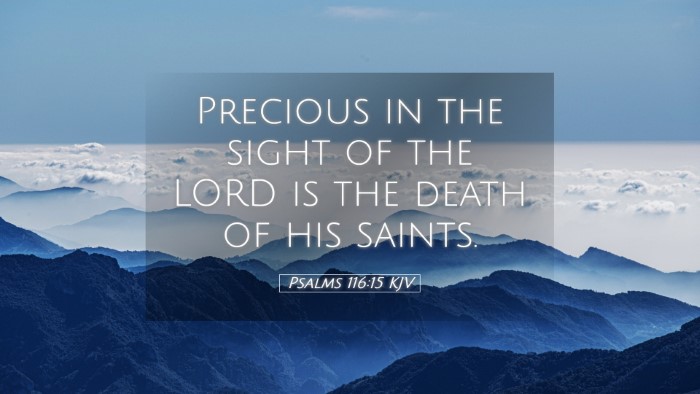Psalms 116:15 - Commentary and Insights
Bible Verse: "Precious in the sight of the LORD is the death of his saints." (Psalm 116:15, KJV)
Introduction
Psalm 116 is a heartfelt expression of gratitude from the psalmist who recounts his deliverance from distress. Verse 15 serves as a profound reflection on the value of life and death in the spiritual context, particularly regarding God’s perspective on the demise of His followers.
General Overview
The verse speaks volumes about God's view of His people, indicating that the death of His saints—those who are holy and set apart for Him—is precious. The imagery and tone reflect a deep reverence for the life and legacy of believers, emphasizing the sanctity of their death in God's sight.
Insights from Matthew Henry
Matthew Henry notes that when the saints depart from this life, it is not merely an end, but a transition into something holy and glorious. He emphasizes:
-
Value of Saints: Henry points out that the worth of God's people transcends their earthly existence. Their death is not a loss but rather a gain as they enter eternal rest.
-
God's Care: He underscores the idea that God takes a special interest in the lives and deaths of believers, showcasing His intimate relationship with them.
-
Celebration of Life: According to Henry, rather than mourning, there should be gratitude for the lives of the saints who have lived faithfully and are welcomed into the divine presence.
Insights from Albert Barnes
Albert Barnes provides a theological and pastoral reflection on this verse, emphasizing the following points:
-
God's Perspective: Barnes highlights that the term "precious" reflects God's view, which differs from human perspectives. In God's eyes, the death of the saints signifies an important transition, filled with value.
-
Context of Suffering: Barnes interprets this verse in the context of suffering and trials, suggesting that the psalmist found solace in knowing that even in death, there is hope and divine favor.
-
Eternal Implication: The emphasis on the "death of his saints" illustrates that their earthly pain is overshadowed by the joy of eternal life with God, reinforcing the belief that death is an integral part of God's salvific plan.
Insights from Adam Clarke
Adam Clarke delves into the theological implications of this verse, providing notable observations:
-
Human Perspective: Clarke discusses the frequent tendency to view death negatively, yet this scripture reminds believers that from God's viewpoint, death can be a positive experience for His followers.
-
Meaning of “Precious”: He elaborates on the Hebrew term used for "precious," denoting something valuable and esteemed. This illustrates God's immense regard for the souls of His people.
-
Reassurance to Believers: Clarke reassures believers that their sacrifices in this life are not in vain. Their faithfulness renders them valuable, and their death leads them to their true home in heaven.
Theological Implications
The theological richness of Psalm 116:15 lies in its affirmation of the covenant relationship between God and His people. It encourages pastors and theologians to reflect on:
-
Hope in Death: This verse provides a basis for pastoral care and counseling, particularly in funerals. It instills hope that death is not the end but a transition to a better existence with God.
-
Value of the Believer: It reaffirms the intrinsic value of the believer, emphasizing that God cherishes His saints individually.
-
Call to Holiness: Recognizing the preciousness of the saint's death invokes a call to live righteously, understanding that believers are to live in a manner worthy of their future hope.
Conclusion
Psalm 116:15 encapsulates a profound truth about the value that God places on the lives and deaths of His people. Through the combined insights of Henry, Barnes, and Clarke, we understand that this verse not only reassures the faithful of their worth but also emphasizes the hopeful perspective that believers are to carry with them throughout their lives. As they reflect on this verse, pastors, students, and scholars alike are encouraged to embrace the comfort and assurance it offers regarding life, death, and the eternal promise that lies beyond.


